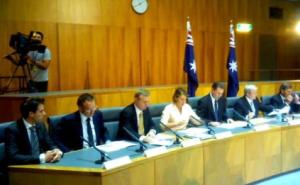
Council of Australian Governments, February 2009. Photo: ALGA
By Angela Dorizas
Federal, state and local governments need to address big ticket issues of a dysfunctional federation, according to the Committee for Economic Development of Australia (CEDA) 2009 Economic and Political Overview released today.
In his review of Australian politics, Kenneth Wiltshire, a JD Story Professor of Public Administration and the University of Queensland Business School, said the Council of Australian Governments (COAG) had delivered some mixed results.
Wiltshire said the new foundation agreement on intergovernmental finance had provided states and territories with “greater certainty” of federal funding, while giving the Commonwealth the upper hand.
“The states and territories are now mainly service deliverers rather than policy partners in the federation,” Wiltshire said.
“Their sovereignty is diminished as they perform to the tune of the Commonwealth and are seen as an extension of the national government to deliver its election pledges.”
Wiltshire said that COAG had successfully reduced industry regulation and will continue to be portrayed as the “engine room of the ship of state in the waters of microeconomic reform”, but Victoria’s failure to cooperate on the Murray-Darling rescue plan had “marred” its achievements in 2008.
The report said that a number or issues would dominate 2009 including occupational health and safety, workers compensation, and the “big ticket aspects of the malfunctioning federation”, such as education, health, environment, transport and infrastructure.
Wiltshire said COAG would need to work on the linkages between federal and state responsibilities, such as the Commonwealth’s supply of doctors and nurses and the running of state hospitals and health systems.
“There is no sign COAG will address these fundamental flaws but will keep tinkering at the margins,” he said.
“Most of them would require constitutional amendments to be properly addressed, not to mention a new tax-sharing system between the three levels of government."
The CEDA political overview also acknowledged greater involvement of local government in the federation, as demonstrated in the inaugural meeting of the Australian Council of Local Government (ACLG) and the $300 million Regional and Local Community Infrastructure Program (RLCIP).
“Once again in the history of this federation a national government had turned to local government to deliver fast employment-generating projects and infrastructure provision,” Wiltshire said.
He said local government had welcomed funding and the “carrot of constitutional recognition”, but the real outcomes of the ACLG summit were yet to be seen.
Wiltshire listed the debate on constitutional recognition for local government as one of the key political issues to watch closely in 2009.
Download the CEDA 2009 Economic and Political Overview.





Leave a Reply